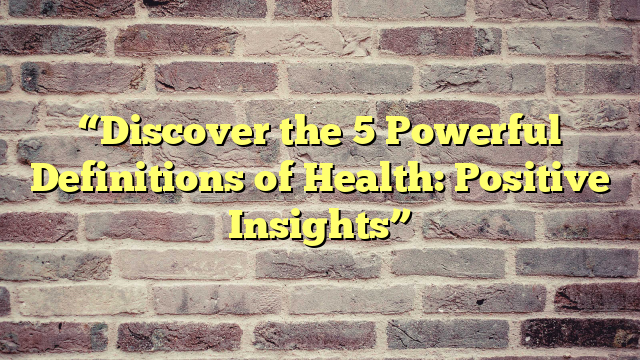Introduction:
Health is a term that is often associated with physical well-being, but in reality, it encompasses a much broader spectrum. It is not just the absence of disease or illness, but also includes mental, emotional, and social well-being. In today’s fast-paced world, it is essential to understand the true meaning of health and how it can impact our lives. In this article, we will delve into the 5 powerful definitions of health that go beyond just physical fitness.
Subheading 1: The World Health Organization’s Definition of Health
The World Health Organization (WHO) defines health as a state of complete physical, mental, and social well-being and not merely the absence of disease or infirmity. This definition highlights the importance of a holistic approach to health and emphasizes that it is not just limited to physical health. It also recognizes the significant role of mental and social factors in overall well-being.
Subheading 2: Health as a Balance of Mind, Body, and Spirit
In ancient Greek medicine, health was perceived as a balance between mind, body, and spirit. This concept has gained popularity in recent years with the rise of alternative medicine practices like yoga and meditation. The idea is that all three aspects – mind, body, and spirit – need to be in harmony for an individual to be truly healthy. Neglecting one can lead to imbalances and affect overall well-being.
Subheading 3: Health as the Ability to Adapt
According to the evolutionary theory of health, the definition of health is the ability to adapt and maintain equilibrium in the face of changing environmental conditions. It emphasizes the importance of resilience and adaptability in maintaining good health. This definition also highlights the role of lifestyle choices in determining an individual’s health status.
Subheading 4: Health as a State of Optimal Functioning
The biomedical model of health defines health as the absence of disease or infirmity. While it is the most traditional and widely accepted definition, it has also received criticism for its narrow focus on physical health. However, a more modern interpretation of this definition is that health is a state of optimal functioning – both physically and mentally. It takes into account individual variations and personal goals for achieving good health.
Subheading 5: Health as a Resource for Life
This definition of health focuses on the ability to perform daily activities, pursue one’s goals, and cope with life’s challenges. It recognizes that health is not just a state but also a resource that enables individuals to live a fulfilling life. It also highlights the importance of preventive measures and maintaining good health to enjoy a better quality of life.
Subheading 6: The Social Determinants of Health
The social determinants of health are the conditions in which people are born, grow, live, work, and age. They include factors like education, income, social support, and access to healthcare. These determinants play a significant role in shaping an individual’s health and well-being. Addressing these factors is crucial in promoting health and reducing health disparities.
Subheading 7: The Impact of Health on Society
The 5 powerful definitions of health discussed above not only have an impact on the individual but also on society as a whole. Good health enables individuals to contribute to society and the economy, leading to overall development and progress. On the other hand, poor health can lead to increased healthcare costs and reduced productivity, negatively affecting society.
Conclusion:
In conclusion, health is not just a physical state but a holistic concept that encompasses mental, emotional, and social well-being. The 5 powerful definitions of health discussed in this article highlight the importance of a comprehensive approach to health and the impact it has on individuals and society. It is essential to understand and strive for good health to live a fulfilling and meaningful life.

